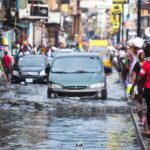Posts tagged with 'South Africa'
The transformation of Buenos Aires’ Rodrigo Bueno neighborhood over the last decade is remarkable. What was once an informal settlement lacking sewers and clean water is now a thriving, diverse community where residents own their homes. A new street system and electrical ...

With about 464 millimeters of rainfall per year — less than half the global average — South Africa is one of the driest countries in the world. Its semi-arid climate, uneven rainfall distribution and persistent droughts leave the country facing chronic water ...

In Gauteng Province, the Jukskei River winds its way through the heart of Johannesburg’s inner-city neighborhoods, informal settlements and suburban areas, eventually joining the Crocodile and Limpopo rivers before emptying into the Indian Ocean. One of the biggest waterways in ...

South Africa’s cities face growing threats to their water resources, especially rivers, as rapid development and climate change undermine the health of water systems and the ecosystem services they provide. Urban areas are particularly vulnerable to serious flood risks during ...

Nearly a decade ago, the world rallied around the Paris Agreement on climate change and the goal of holding global temperature rise to 1.5 degrees C (2.7 degrees F). Since then, the “1.5C goal” has become the world’s North Star ...

At a moment when all countries need to raise their ambition on climate action, the opposite seems to be happening. Headline after headline show lackluster progress and rolled-back commitments. For one, climate change was a low priority for voters in ...

Despite accounting for less than 3% of global terrestrial area, cities have had an outsized impact on our approach to planetary boundaries, affecting biodiversity and consumption of materials and energy. Studies show that cities have become responsible for 78% of carbon emissions, ...

Extreme weather events like floods and droughts are becoming more frequent and intense around the globe, disrupting communities and the infrastructure they rely on. In 2024 alone, the world endured 58 disasters that wreaked over a billion dollars in damages each. Yet ...

Africa’s cities, from large metropolises to smaller towns, are increasingly characterized by growing urban sprawl. Kinshasa, Democratic Republic of Congo, is expanding by about 2,000 people and 5 hectares (10 football fields) every day, according to a World Bank estimate. Kumasi, an intermediary ...

COP30 in Belém, Brazil, will be the most substantial and strategic mechanism for local and subnational governments to influence and impact national and global sustainability agendas in 2025. As we gear up for the mid-year Bonn Climate Conference, it is ...

For the 21 million residents of Lagos, Nigeria, climate change is not a distant concept — it is a current reality. Over the past decade, the city has experienced devastating floods, exacerbated by the loss of over half of its wetlands ...

2024 has been a tumultuous year: More than half the world’s population went to the ballot box — some voting for radical change — extraordinary weather events have devastated communities and countries have been rocked by continued violent conflict. Given ...

In January 2024, the Central Business District of Cape Town, South Africa, endured a historically brutal day of heat: temperatures climbed to 44 degrees C – the highest ever measured in the city. But on that same day, people in other parts ...

In a time of polycrises – from economic and political instability to health and environmental emergencies – water is a resource that cannot be relegated to the background. Especially in urban environments, water demand is ever-increasing and in too many ...

Cities are home to more than half the world’s population: 4.4 billion people commuting, working, eating, shopping, and using light, heat and air conditioning. As a result, cities collectively produce over 70% of the greenhouse gas (GHG) emissions warming the planet. They ...


























